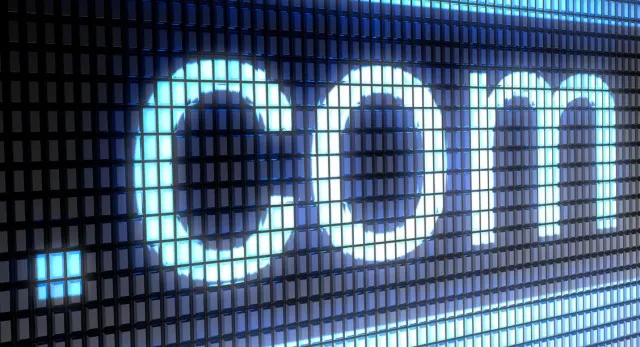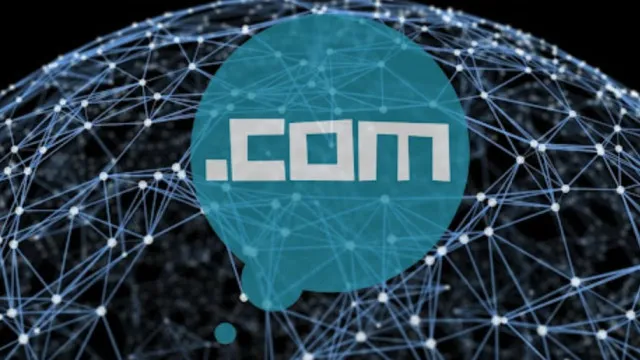When you search for something online, chances are, you’ve come across a website with a “.com” domain. It’s the most common domain extension on the internet, but have you ever wondered what it really means? Understanding the origin and significance of “.com” can give us a glimpse into how the internet was built and how it has evolved over time.

Image Credit: Getty
The History of the “.com” Domain
The “.com” domain was established on January 1, 1985, and was part of the first batch of top-level domains (TLDs) created to structure the internet. Alongside other extensions like “.edu” for educational institutions, “.gov” for government sites, and “.org” for organizations, “.com” was originally intended for commercial purposes.
The term “.com” stands for “commercial,” meaning it was designed for businesses that sought an online presence to connect with customers. During the early days of the internet, companies needed a way to differentiate their websites from others, and “.com” quickly became the go-to extension for any business-related website.
Why “.com” Became So Popular
In the early days of the internet, “.com” was strictly reserved for businesses. Over time, however, its use broadened. As more individuals, organizations, and entrepreneurs wanted to create their own websites, the original restrictions around “.com” started to fade. It soon became a default domain extension for anyone, regardless of the website’s purpose.
This shift helped “.com” evolve into a widely accepted and versatile domain. Whether you’re building a business, a personal blog, or a nonprofit site, “.com” is often the first choice, making it the most popular and recognized domain extension globally.
How “.com” Compares to Other Domain Extensions
There are various domain extensions available today, each serving a specific purpose. For instance, the “.edu” domain is exclusively for educational institutions like universities and schools, signaling that the website is affiliated with education. Similarly, “.gov” is strictly used for government-related websites, ensuring credibility and authority in its content.
Another commonly seen domain extension is “.org,” which is typically used by nonprofit organizations. This extension indicates that the site is focused on a mission rather than profit-making, making it a preferred choice for charities, advocacy groups, and educational nonprofits.

Image Credit: Getty
On the other hand, newer domain extensions like “.io” have become popular, particularly among tech companies and startups. Although “.io” originally represented the British Indian Ocean Territory, its adoption by tech startups has given it a more modern, trendy feel. Unlike “.com,” “.io” doesn’t have a historical business-related meaning but is often chosen for its contemporary appeal.
The Continued Dominance of “.com”
Despite the emergence of alternative domain extensions, “.com” remains the most recognized and widely used TLD. It continues to be the top choice for businesses, organizations, and even individuals because of the trust and familiarity associated with it. When people see a “.com” domain, they often perceive the website as professional, credible, and authoritative.
The popularity of “.com” also stems from its global reach. Many internet users instinctively type “.com” at the end of a web address, assuming that it’s the correct extension. Because of this, having a “.com” domain can increase a website’s visibility and make it easier for visitors to find.

As the internet expanded, “.com” was used for various non-commercial purposes. Image Credit: Getty
Why People Still Prefer “.com” Domains
The “.com” domain has become so ingrained in the internet culture that even as new domains are created, most businesses still opt for “.com.” It gives websites a sense of legitimacy and professionalism, especially in an increasingly competitive online marketplace.
A discussion on Reddit highlighted this perception of “.com” domains. Users noted that when they see a website with a “.com” extension, they automatically associate it with a business or an organization that offers products or services. It’s a small detail that can have a significant impact on how visitors view a site.
How “.com” Reflects the Growth of the Internet
The history of the “.com” domain is closely tied to the development of the internet itself. In the early days, there were only a handful of domain extensions available, and each had a clearly defined purpose. As the internet grew, so did the need for more domains, which led to the expansion of available TLDs. Despite the variety of options now available, “.com” has remained the gold standard.

Initially, “.com” was created exclusively for commercial enterprises. Image Credit: Getty
The early adopters of “.com” domains helped establish the internet’s commercial potential. In the years since, “.com” has grown beyond its original purpose, becoming a symbol of the internet’s expansion and the increasing importance of online presence for businesses and individuals alike.
Conclusion: The Enduring Significance of “.com”
In today’s digital age, the “.com” domain represents more than just a commercial website—it’s a mark of professionalism, credibility, and global reach. Although new domain extensions are continually being introduced, “.com” remains the most sought-after and trusted option for anyone looking to establish an online presence.
From its origins as a business-focused extension to its current status as the most popular domain on the web, “.com” has played a crucial role in shaping the internet as we know it. Whether you’re launching a startup, running a blog, or building an online portfolio, a “.com” domain will always be a solid choice, helping you stand out in the vast world of the web.


